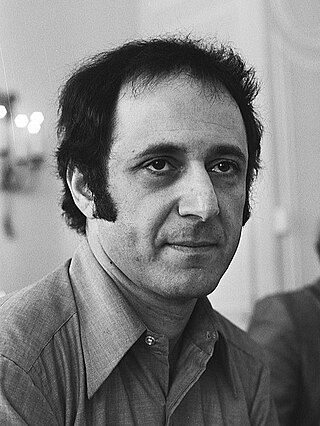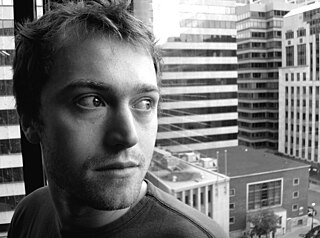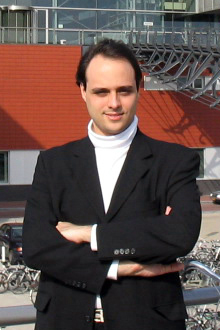
Stephen Michael Reich is an American composer who is known for his contribution to the development of minimal music in the mid to late 1960s. Reich's work is marked by its use of repetitive figures, slow harmonic rhythm, and canons. Reich describes this concept in his essay, "Music as a Gradual Process", by stating, "I am interested in perceptible processes. I want to be able to hear the process happening throughout the sounding music." For example, his early works experiment with phase shifting, in which one or more repeated phrases plays slower or faster than the others, causing it to go "out of phase." This creates new musical patterns in a perceptible flow.

Musical composition can refer to an original piece or work of music, either vocal or instrumental, the structure of a musical piece or to the process of creating or writing a new piece of music. People who create new compositions are called composers. Composers of primarily songs are usually called songwriters; with songs, the person who writes lyrics for a song is the lyricist. In many cultures, including Western classical music, the act of composing typically includes the creation of music notation, such as a sheet music "score", which is then performed by the composer or by other musicians. In popular music and traditional music, songwriting may involve the creation of a basic outline of the song, called the lead sheet, which sets out the melody, lyrics and chord progression. In classical music, orchestration is typically done by the composer, but in musical theatre and in pop music, songwriters may hire an arranger to do the orchestration. In some cases, a pop or traditional songwriter may not use written notation at all and instead compose the song in their mind and then play, sing or record it from memory. In jazz and popular music, notable sound recordings by influential performers are given the weight that written or printed scores play in classical music.

IRCAM is a French institute dedicated to the research of music and sound, especially in the fields of avant garde and electro-acoustical art music. It is situated next to, and is organisationally linked with, the Centre Pompidou in Paris. The extension of the building was designed by Renzo Piano and Richard Rogers. Much of the institute is located underground, beneath the fountain to the east of the buildings.
Silkroad, formerly the Silk Road Project, Inc., is a not-for-profit organization, initiated by the cellist Yo-Yo Ma in 1998, promoting collaboration among artists and institutions, promoting multicultural artistic exchange, and studying the ebb and flow of ideas. The project was first inspired by the cultural traditions of the historical Eurasian Silk Road trade routes and now encompasses a number of artistic, cultural and educational programs focused on connecting people and ideas from around the world. It has been described as an "arts and educational organization that connects musicians, composers, artists and audiences around the world" and "an initiative to promote multicultural artistic collaboration."
Ralph Farris is an American violist, violinist, composer, arranger, producer and conductor, best known as a founding member and artistic director of the ensemble ETHEL. Farris is an electric string player with a lengthy career that spans the gamut of musical genres from rock and jazz to Broadway. His instruments are outfitted with a piezoelectric pickup which allows him to play amplified. Amplification was initially adopted early in Farris's career in order to facilitate the playing of various "contemporary classical" pieces that involve electronic components. It continues to be integral to his signature sound.

Javier Torres Maldonado is a Mexican composer internationally recognized for, mostly, his orchestral, chamber, vocal and electro-acoustic works.

Futurism was an early 20th-century art movement which encompassed painting, sculpture, poetry, theatre, music, architecture, cinema and gastronomy. Filippo Tommaso Marinetti initiated the movement with his Manifesto of Futurism, published in February 1909. Futurist music rejected tradition and introduced experimental sounds inspired by machinery, and influenced several 20th-century composers. According to Rodney Payton, "early in the movement, the term ‘Futurism’ was misused to loosely define any sort of avant-garde effort; in English, the term was used to label a composer whose music was considered ‘difficult.’"
Christopher Adler is a musician, composer and music professor at University of San Diego. A virtuoso player of the khaen, a reed instrument native to Laos and Thailand, he has been composing works for the khaen both as a solo instrument and in combination with western instruments since 1996. His works for solo piano include the three-part Bear Woman Dances, commissioned to accompany a dance depicting a Korean creation myth and largely based the Korean musical system nongak. Four of his compositions have been broadcast internationally on WGBH's Art of the States series. His composition for sheng, viola and percussion, Music for a Royal Palace, was commissioned by Carnegie Hall for Yo-Yo Ma's Silk Road Project. An homage to Thailand's Bang Pa-In Palace, the work incorporates traditional Thai melody and embellishments. It was performed at Zankel Hall in 2006 and recorded at the Tanglewood Music Center that same year. His Serpent of Five Tongues for sheng and guanzi premiered at the 2011 MATA Festival.

Huck Hodge is an American composer of contemporary classical music.

Dominique Dalcan is a French electronic musician and film composer. He is the winner of the "victoires de la musique" in 2018 in the category "electronic album".
Albena Petrovic-Vratchanska is a Luxembourgian composer of Bulgarian roots, a pianist and musical pedagogue.

Taylor Brook is a composer of contemporary classical music who currently resides in New York City.
Henry Vega is a composer and Electroacoustic musician from New York City, currently living in The Hague, Netherlands. He founded The Spycollective in 2006, a now defunct music, theater and dance group, and is a founding director of Artek Foundation. Vega has been composing and performing internationally since 2001 and is also a founding member of The Electronic Hammer trio with Diego Espinosa and Juan Parra Cancino. He is married to Polish composer Kasia Glowicka.
The Sond’Ar-te Electric Ensemble is a Portuguese chamber ensemble, based in Lisbon, which specialises in contemporary classical music. This is an innovative music ensemble in the European new music scene which the core structure is the permanent combination of 5 acoustic instruments with electronics relying on the Miso Studio’s technical expertise.

Juan Manuel Abras Contel is a classical music composer, conductor, musicologist and historian from Sweden. Born in Stockholm to a European family that moved around the world, Abras became a cosmopolitan artist and scientist.

Hélène Breschand is a French harpist, composer and improviser. Breschand leads a career both as a solo artist as well as in ensemble work, playing both a contemporary repertoire and premiering new works as much as she plays improvised music and musical theater. She is a musician who plays on the verge of several genres ranging from contemporary music to jazz. She plays both written and improvised music.

The International Chamber Music Festival in Plovdiv was founded in 1964 by a group of music enthusiasts, with the support of the Plovdiv Municipality and the Ministry of Culture.

Noémi Győri is a Hungarian classical flautist.
Ensemble Nostri Temporis(ENT) is a Ukrainian ensemble that specializes in performing contemporary classical music and promoting the work of contemporary composers, including Ukrainian. Ensemble Nostri Temporis also organizes art events in Ukraine dedicated to new music.
Will Healy is an American composer, pianist, and artistic director of ShoutHouse, an orchestral hip-hop collective.












